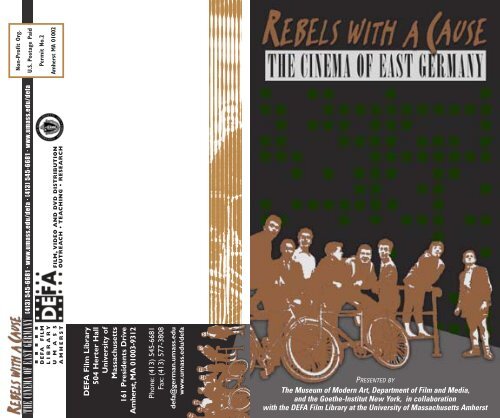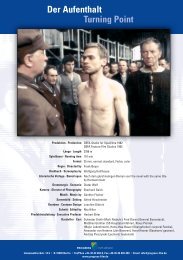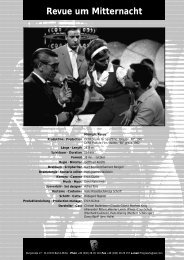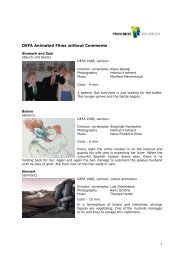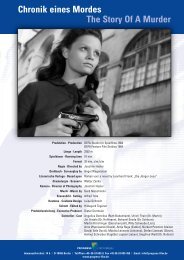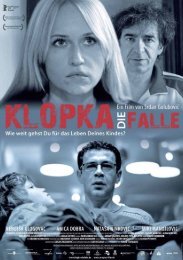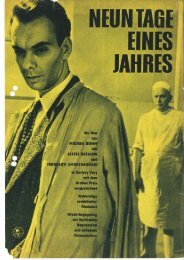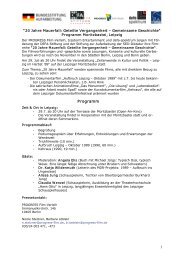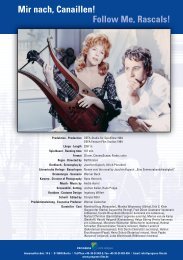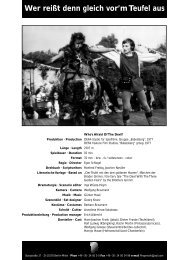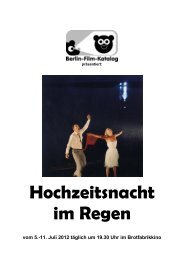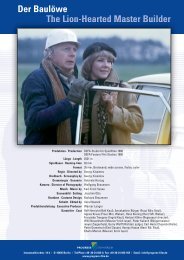Print Moma Katalog - University of Massachusetts Amherst
Print Moma Katalog - University of Massachusetts Amherst
Print Moma Katalog - University of Massachusetts Amherst
You also want an ePaper? Increase the reach of your titles
YUMPU automatically turns print PDFs into web optimized ePapers that Google loves.
Non-Pr<strong>of</strong>it Org.<br />
U.S. Postage Paid<br />
(413) 545-6681 · www.umass.edu/defa · (413) 545-6681 · www.umass.edu/defa<br />
Permit No.2<br />
<strong>Amherst</strong> MA 01002<br />
FILM, VIDEO AND DVD DISTRIBUTION<br />
OUTREACH • TEACHING • RESEARCH<br />
DEFA FILM<br />
LIBRARY<br />
U M A S S<br />
AMHERST<br />
DEFA Film Library<br />
504 Herter Hall<br />
<strong>University</strong> <strong>of</strong><br />
<strong>Massachusetts</strong><br />
161 Presidents Drive<br />
<strong>Amherst</strong>, MA 01003-9312<br />
Phone: (413) 545-6681<br />
Fax: (413) 577-3808<br />
defa@german.umass.edu<br />
www.umass.edu/defa<br />
PRESENTED BY<br />
The Museum <strong>of</strong> Modern Art, Department <strong>of</strong> Film and Media,<br />
and the Goethe-Institut New York, in collaboration<br />
with the DEFA Film Library at the <strong>University</strong> <strong>of</strong> <strong>Massachusetts</strong> <strong>Amherst</strong>
SCREENED AT<br />
THE MUSEUM OF MODERN ART<br />
OCTOBER 7-23, 2005<br />
ALL FILMS IN GERMAN WITH NEW ENGLISH SUBTITLES<br />
EXHIBITED IN NEWLY STRUCK 35MM PRINTS<br />
The Museum <strong>of</strong> Modern Art and the Goethe-Institut New York, in<br />
collaboration with the DEFA Film Library at the <strong>University</strong> <strong>of</strong><br />
<strong>Massachusetts</strong> <strong>Amherst</strong>, present the most comprehensive<br />
retrospective <strong>of</strong> East German cinema ever screened in the U.S.<br />
It brings together scholars, directors, and actors <strong>of</strong> the DEFA period<br />
(1946–92) to present the films and reflect on the political complexities<br />
<strong>of</strong> artistic production in the East German state-owned DEFA studios.<br />
DEFA produced over 7,500 films—many <strong>of</strong> them at the famous<br />
Babelsberg Studio outside <strong>of</strong> Berlin. More than a dozen have been<br />
voted among the 100 best German films ever made in recent surveys.<br />
Yet, these and other original and creative documentaries and<br />
fiction films from East Germany are largely unknown to film<br />
enthusiasts, both in Germany and around the world.<br />
Rebels with a Cause presents a selection <strong>of</strong> significant works, rich<br />
in theme, structure, and style, and deserving <strong>of</strong> (re)discovery.<br />
These films were crafted by inventive filmmakers who dared to test<br />
the limits <strong>of</strong> censorship, and whose films’ political engagement and<br />
depth add to their creative merit in the context <strong>of</strong> film history. In<br />
selecting films for this series we viewed over 200 titles in Berlin<br />
and New York, and were impressed by the depth and variety we<br />
found in this “other” German cinema. For this series <strong>of</strong> 21 films, we<br />
looked for a range <strong>of</strong> voices and styles from five decades <strong>of</strong> filmmaking,<br />
placing an emphasis on creative energy, artistic innovation,<br />
and challenges to authority – hence the title, Rebels with a Cause.<br />
We are extremely grateful to the Max Kade Foundation, Inc., and<br />
the other supporters and sponsors that have made it possible to<br />
screen these films in new 35mm prints with new English subtitles.<br />
I would also like to express my special thanks to my co-curator<br />
Juliane Wanckel (Program Manager, Goethe-Institut New York)<br />
and to Hiltrud Schulz (Sales and Outreach Manager, DEFA Film<br />
Library, <strong>University</strong> <strong>of</strong> <strong>Massachusetts</strong> <strong>Amherst</strong>), who have made this<br />
project an especially gratifying and joyful collaborative experience.<br />
I hope you will enjoy the screenings and seek out more <strong>of</strong> these<br />
groundbreaking films.<br />
Jytte Jensen<br />
Curator<br />
Department <strong>of</strong> Film and Media<br />
The Museum <strong>of</strong> Modern Art
THE ARCHITECTS (Die Architekten)<br />
1990, 97 min., color<br />
DIRECTOR: Peter Kahane<br />
CAST: Kurt Naumann, Rita Feldmeier, Uta Eisold, Jürgen Watzke,<br />
Ute Lubosch<br />
CINEMATOGRAPHY:<br />
Andreas Köfer<br />
SCREENPLAY: Thomas Knauf,<br />
Peter Kahane<br />
Filmed as the GDR crumbled, this somber and nuanced portrait <strong>of</strong><br />
life in East Berlin depicts a young architect who feels his life and<br />
goals are being strangled by communist dogma, represented in<br />
part by the older generation. The film team had to rebuild part <strong>of</strong><br />
the Wall to depict scenes from 1989, as it had been removed so fast.<br />
“Telling, finely drawn, superbly acted!”<br />
– The New York Times<br />
Peter Kahane, born in Prague in 1949, studied at the Film and Television Academy<br />
in Potsdam-Babelsberg. His debut film, Women’s Work, premiered in 1984.<br />
Prepared for Love and the prizewinning Ete and Ali; (a coming-<strong>of</strong>-age story<br />
featuring two friends who have just completed their mandatory military service),<br />
exemplify Kahane’s superb depictions <strong>of</strong> everyday life. The Architects was<br />
Kahane’s most critical and politically engaged film. After the fall <strong>of</strong> the Berlin<br />
Wall, he took a short break from filmmaking before releasing Cosima’s Lexicon<br />
(1992) and To the Horizon and Beyond (1999). Since the mid-1990s, he has also<br />
been directing and writing screenplays for TV movies and crime series.<br />
Kahane is currently working on a feature film for release in 2006.<br />
BERLIN–SCHÖNHAUSER CORNER<br />
(Berlin – Ecke Schönhauser…), 1957, 82 min., b/w<br />
DIRECTOR: Gerhard Klein<br />
CAST: Ekkehard Schall, Ilse Pagé, Ernst-Georg Schwill,<br />
Helga Göring<br />
CINEMATOGRAPHY:<br />
Wolf Göthe<br />
SCREENPLAY:<br />
Wolfgang Kohlhaase<br />
Rebels with a cause. This classic 1950s teen cult film is a perceptive<br />
social portrayal <strong>of</strong> a city in which political and economic division<br />
have affected the entire population. Although the film became a<br />
box-<strong>of</strong>fice hit, it was greeted with suspicion by GDR cultural<br />
<strong>of</strong>ficials. Gerhard Klein and screenwriter Wolfgang Kohlhaase were<br />
reproached for emphasizing “negative problematic images <strong>of</strong> our<br />
[East German] life.” Despite the negative reception from GDR<br />
<strong>of</strong>ficials, this film was loved by the public precisely for its truthful<br />
portrayal <strong>of</strong> everyday life. Ranked by film critics among Germany’s<br />
100 most important films, this and other “Berlin films” by director<br />
Klein and screenwriter Kohlhaase made an important contribution<br />
to the international youth film genre.<br />
“…told in a neo-realistic style”<br />
– The Oxford History <strong>of</strong> World Cinema<br />
Gerhard Klein (1920 –1970) was born in Berlin. He joined the resistance against the<br />
Nazis and was arrested twice. Klein was self-educated and after the war worked<br />
as a cartoonist and documentary filmmaker. He began working for DEFA as a<br />
screenwriter for short and documentary films in 1946, and for feature films in 1952.<br />
All his films express the poetry <strong>of</strong> daily life and his fascination with his beloved<br />
Berlin. Along with screenwriter Wolfgang Kohlhaase, Klein produced a series <strong>of</strong><br />
what are called the “Berlin Films.” Berlin Around the Corner was banned by East<br />
German <strong>of</strong>ficials in 1966 and the style <strong>of</strong> his film The Gleiwitz Case was interpreted<br />
as converging too closely with a fascistic aesthetic. [See also, The Gleiwitz Case]
THE BICYCLE (Das Fahrrad)<br />
1981, 89 min., color<br />
DIRECTOR: Evelyn Schmidt<br />
CAST: Heidemarie Schneider, Roman Kaminski, Anke Friedrich,<br />
Heidrun Bartholomäus<br />
CINEMATOGRAPHY:<br />
Roland Dressel<br />
SCREENPLAY: Ernst Wenig<br />
Susanne is a single mother living a somewhat carefree lifestyle.<br />
After quitting her job, she finds herself in deep financial trouble and<br />
attempts a minor fraud to make ends meet. Despite its rare view <strong>of</strong><br />
everyday socialism from a woman’s perspective, GDR <strong>of</strong>ficials were<br />
critical <strong>of</strong> this frank portrayal <strong>of</strong> a less-than-ideal socialist citizen<br />
and turned down all invitations for the film to be screened abroad.<br />
In West Germany, however, Schmidt’s film received much praise for<br />
its critical view and feminist approach.<br />
“The Bicycle is a little story packed with tremendous hope ... it raises<br />
important and essential questions <strong>of</strong> personal responsibility and what we<br />
can expect from life.” – Norddeutsche Zeitung<br />
“A sensitive portrait <strong>of</strong> a woman by DEFA director Evelyn Schmidt ....<br />
Remarkable are the sympathetic portrayal <strong>of</strong> a work-rejecting outsider and<br />
the realistic description <strong>of</strong> East German daily life.“<br />
– Lexikon des Internationalen Films<br />
Evelyn Schmidt was born in Görlitz in 1949 and moved to Berlin in 1963. She spent a<br />
year as an apprentice with East German television and graduated with a degree in<br />
directing from the Film and Television Academy in Potsdam-Babelsberg in 1973.<br />
Schmidt participated in Konrad Wolf’s master class at the Academy <strong>of</strong> the Arts in<br />
Berlin and began directing in the 1970s. From 1977 to 1990 she worked as an assistant<br />
director and later as a director at the DEFA Studio for Feature Films, debuting with<br />
Infidelity (1979). Since 1990 she has directed documentaries for television and<br />
produced 13 plays at an experimental theater. Schmidt has also taught film and acting,<br />
and is currently working on a children’s movie.<br />
BORN IN ‘45 (Jahrgang 45)<br />
1966/1990, 94 min., b/w<br />
DIRECTOR: Jürgen Böttcher<br />
CAST: Monika Hildebrand, Rolf Römer, Paul Eichbaum,<br />
Holger Mahlich<br />
CINEMATOGRAPHY:<br />
Roland Gräf<br />
SCREENPLAY: Klaus Poche,<br />
Jürgen Böttcher<br />
Born in ‘45 is the only narrative film by painter and documentary<br />
filmmaker Jürgen Böttcher. Inspired by Italian neo-realism, he<br />
developed a sensitive style characterized by detailed social observation<br />
and poetic verve. Newlyweds Alfred and Lisa decide to<br />
divorce. Alfred takes a few days <strong>of</strong>f to clear his head, wandering<br />
through Berlin and meeting strangers. Though he ultimately returns<br />
to Lisa, the plot remains open-ended. This film can be considered<br />
East Germany’s closest counterpart to early Godard. Officials<br />
banned the film in 1966, describing it as “indifferent and insignificant.”<br />
It wasn’t seen by audiences until 1990 and Böttcher never<br />
returned to narrative filmmaking.<br />
“This film is like a kind <strong>of</strong> ballet, expressing what cannot be said with<br />
words. There are the most beautiful arrangements. The naive nature <strong>of</strong><br />
the performance and the beauty <strong>of</strong> the camera movements and angles are<br />
stunning .…” – Rolf Richter, Filmspiegel<br />
Jürgen Böttcher, also known as the painter “Strawalde,” was born in 1931 in<br />
Frankenberg. He studied at the Dresden Academy <strong>of</strong> Fine Arts from 1949 to 1953,<br />
during which time he worked as an independent artist and taught night school,<br />
where he met the now famous painter A.R. Penck. From 1955 to 1960, Böttcher<br />
studied directing at the Film Academy in Potsdam-Babelsberg and worked as a<br />
director in the DEFA Studio for Documentary Films until 1991. Having made more<br />
than 30 artistically provocative films, he has attained cult status among cineastes.<br />
Jürgen Böttcher has been working as an independent artist since 1991 and<br />
currently lives in Berlin. [See also, Shunters]
CARBIDE AND SORREL (Karbid und Sauerampfer)<br />
1963, 80 min., b/w<br />
DIRECTOR: Frank Beyer<br />
CAST: Erwin Geschonneck, Kurt Rackelmann, Rudolf Asmus,<br />
Marita Böhme, Margot Busse<br />
CINEMATOGRAPHY:<br />
Günter Marczinkowsky<br />
SCREENPLAY: Hans Oliva<br />
At the end <strong>of</strong> World War II,<br />
workers in Dresden send<br />
their colleague Kalle hundreds<br />
<strong>of</strong> miles north to pick<br />
up welding supplies for their factory. Kalle’s attempts to move the<br />
supplies through the Soviet occupation zone become a hilarious<br />
odyssey full <strong>of</strong> high jinks and misadventures. The screenplay was a<br />
lucky find for the director, as was the leading actor Erwin<br />
Geschonneck, a man whose self-confidence and laconic wit had<br />
gotten him through many ups and downs. The film’s comic high<br />
point is a boat trip down the Elbe, when Kalle raises the suspicion<br />
<strong>of</strong> both Soviet and American patrols. Director Frank Beyer first took<br />
his film to Moscow, since GDR <strong>of</strong>ficials <strong>of</strong>ten questioned humor<br />
which flouted political authority. The hearty laughter <strong>of</strong> the Soviet<br />
functionaries there gave the green light for a German premiere.<br />
”One <strong>of</strong> the best German film comedies.”<br />
– The Oxford History <strong>of</strong> World Cinema<br />
Frank Beyer is known for having directed some <strong>of</strong> the most powerful and<br />
historically significant films at DEFA. Born in Nobitz in 1932 he studied theater in<br />
Berlin, and then directing at the renowned Prague Film School (FAMU). From 1958<br />
to 1966 Beyer directed films such as Naked Among Wolves and Five Cartridges,<br />
as well as Carbide and Sorrel. In 1966 Trace <strong>of</strong> Stones was banned and Beyer<br />
was expelled from the studio. He then directed for the stage and began a prolific<br />
career in television, which continues today. In 1974 he re-emerged at DEFA with<br />
Jacob the Liar, which was nominated for an Oscar for best foreign film. Since<br />
German unification, Beyer has primarily worked in television, creating feature<br />
films such as St. Nicholas Church (1995), an account <strong>of</strong> the collapse <strong>of</strong> the GDR.<br />
In 1990 Beyer became a member <strong>of</strong> the Academy <strong>of</strong> Arts and in 1991 he was<br />
awarded the State Film Prize in Gold for lifetime achievement. The Film Museum<br />
Potsdam has recently purchased the Frank Beyer collection, including materials<br />
that provide an in-depth view <strong>of</strong> his life and work.<br />
THE GLEIWITZ CASE (Der Fall Gleiwitz)<br />
1961, 69 min., b/w<br />
DIRECTOR: Gerhard Klein<br />
CAST: Hannjo Hasse, Herwart Grosse, Hilmar Thate, Georg Leopold,<br />
Wolfgang Kalweit<br />
CINEMATOGRAPHY: Jan C`´ur`´ík<br />
SCREENPLAY: Wolfgang<br />
Kohlhaase, Günther Rücker<br />
The Gleiwitz Case is a<br />
detailed reconstruction <strong>of</strong><br />
the 1939 surprise attack by a<br />
Nazi unit on the radio station in Gleiwitz, which was blamed on Polish<br />
forces and served as Hitler’s justification for marching into Poland –<br />
thus starting WWII. Cool and distanced, the film reflects on the possibilities<br />
and techniques <strong>of</strong> provocation, and how facts and opinions can<br />
be manipulated to make people accept lies, murder, and war.<br />
Director Gerhard Klein and his Czech cameraman Jan C`´ur`´ík create<br />
an impressive visual language to describe fascism. This enlightening<br />
perspective on the underpinnings <strong>of</strong> totalitarian power and violence<br />
was met with resistance among GDR <strong>of</strong>ficials. The film was accused<br />
<strong>of</strong> aestheticizing fascism and, although it narrowly escaped<br />
censorship, it disappeared after only a few weeks in theaters.<br />
Today, the film is considered one <strong>of</strong> the most modern and<br />
experimental films in DEFA history.<br />
“… a clever story … an eccentric reenactment <strong>of</strong> an event from history.<br />
The Gleiwitz Case suggests a more starched, controlled Dr. Strangelove<br />
crossed with the formal austerity <strong>of</strong> Triumph <strong>of</strong> the Will, and its tone falls<br />
just short <strong>of</strong> loco.” – Felicia Feaster, Creative Loafing<br />
Gerhard Klein (1920 –1970) was born in Berlin. He joined the resistance against the<br />
Nazis and was arrested twice. Klein was self-educated and after the war worked as a<br />
cartoonist and documentary filmmaker. He began working for DEFA as a screenwriter<br />
for short and documentary films in 1946, and for feature films in 1952. All his films<br />
express the poetry <strong>of</strong> daily life and his fascination with his beloved Berlin. Along with<br />
screenwriter Wolfgang Kohlhaase, Klein produced a series <strong>of</strong> what are called the<br />
“Berlin Films.” Berlin Around the Corner was banned by East German <strong>of</strong>ficials in 1966<br />
and the style <strong>of</strong> his film The Gleiwitz Case was interpreted as converging too closely<br />
with a fascistic aesthetic. [See also, Berlin–Schönhauser Corner]
HER THIRD (Der Dritte)<br />
1971, 111 min., color<br />
DIRECTOR: Egon Günther<br />
CAST: Jutta H<strong>of</strong>fmann, Barbara Dittus, Rolf Ludwig,<br />
Armin Mueller-Stahl<br />
CINEMATOGRAPHY: Erich Gusko<br />
SCREENPLAY: Günther Rücker<br />
Her Third recounts eighteen<br />
years in the life <strong>of</strong> Margit<br />
through a series <strong>of</strong> flashbacks.<br />
After two failed<br />
relationships, each <strong>of</strong> which produced a child, a newly liberated<br />
Margit discovers herself. Her amorous pursuit <strong>of</strong> a colleague<br />
provides not only an entertaining love story, but also a testament to<br />
the evolving self-confidence and independence <strong>of</strong> East German<br />
women. Jutta H<strong>of</strong>fmann was named Best Actress at the 1972 Venice<br />
Film Festival for her performance in this film, playing opposite<br />
Oscar-nominated actor Armin Mueller-Stahl.<br />
“Jutta H<strong>of</strong>fmann [is] a small person with enormous charisma, who<br />
establishes such a direct connection with her viewers that they<br />
experience each emotion and laugh and cry with her.”<br />
– Heinz Kersten, film critic<br />
Egon Günther was born in Schneeberg in 1927. In 1958 he began working as a<br />
dramaturg and screenwriter at the DEFA studios and by 1964 was directing his<br />
own screenplays. His works are about contemporary life but he also directed<br />
literary film adaptations. With Lotte in Weimar (1975) he started a series <strong>of</strong> films<br />
about Goethe – which continued with The Mask <strong>of</strong> Desire (1999). Critics describe<br />
Günther as an avant-gardist <strong>of</strong> East German cinema, known for his stylistically<br />
sophisticated and internationally competitive films. Günther was increasingly<br />
beset with political difficulties, leading to the censorship <strong>of</strong> several <strong>of</strong> his films.<br />
He finally decided to leave for West Germany in 1978 after his television film<br />
Ursula was snubbed by the regime. In West Germany he worked mainly in<br />
television and returned to DEFA at the end <strong>of</strong> 1989 to make his film Stein.<br />
THE LEGEND OF PAUL AND PAULA<br />
(Die Legende von Paul und Paula), 1972, 106 min., color<br />
DIRECTOR: Heiner Carow<br />
CAST: Angelica Domröse, Winfried Glatzeder, Heidemarie Wenzel,<br />
Fred Delmare<br />
CINEMATOGRAPHY:<br />
Jürgen Brauer<br />
SCREENPLAY: Ulrich Plenzdorf,<br />
Heiner Carow<br />
Author Ulrich Plenzdorf and<br />
director Heiner Carow winningly portray this story <strong>of</strong> undefeatable,<br />
passionate love between a single mother and a married bureaucrat<br />
in East Berlin. Featuring the music <strong>of</strong> the East German cult rock band,<br />
the Puhdys, the film proved enormously popular, despite limited<br />
media coverage. The Legend <strong>of</strong> Paul and Paula remains a cult<br />
favorite today.<br />
“[This film] shows that the 70s all over the world, even in the GDR, were<br />
the 70s.” – Jennie Livingston, filmmaker (Paris Is Burning)<br />
“I knew that the film would be good. It was going to be explosive and<br />
maybe it wouldn’t make it through, but it was going to be good.”<br />
– Ulrich Plenzdorf, screenwriter<br />
Heiner Carow (1929–1997) was born in Rostock. Directors Gerhard Klein and<br />
Slatan Dudow were his mentors in the DEFA studio class for young directors from<br />
1950 to 1952. In 1956 Carow made his first feature, Sheriff Teddy, with many<br />
similarities to Klein’s “Berlin Films.” His film, The Russians Are Coming (1968), was<br />
banned and labeled as “contaminated with modernism.” The Legend <strong>of</strong> Paul and<br />
Paula became an unparalleled success, however, and is said to have been the<br />
longest playing film in German cinemas. Carow’s penchant for creating films that<br />
candidly reflected everyday life in socialism <strong>of</strong>ten put him into conflict with<br />
<strong>of</strong>ficials, but his pr<strong>of</strong>essionalism and artistic acuity gained him the position <strong>of</strong> Vice<br />
President <strong>of</strong> the Academy <strong>of</strong> Arts <strong>of</strong> the GDR (1982–1993). He was awarded many<br />
film prizes, including a Silver Bear at the 1990 Berlin International Film Festival for<br />
Coming Out, the only East German feature film about homosexuality.
MOTHER (Die Mutter)<br />
1958, 147 min., b/w, screening in 16mm<br />
DIRECTOR: Manfred Wekwerth<br />
CAST: Helene Weigel, Fred Düren, Erich Franz, Fritz Hollenbeck,<br />
Günter Naumann, Helga Raumer, Norbert Christian<br />
CINEMATOGRAPHY:<br />
Harry Bremer<br />
SCREENPLAY: Käthe Rülicke-<br />
Weiler, Manfred Wekwerth,<br />
Harry Bremer, Isot Kilian<br />
Produced by the DEFA Studio for Newsreels and Documentary Films, on behalf<br />
<strong>of</strong> the Berliner Ensemble.<br />
Bertolt Brecht’s grand epic <strong>of</strong> political theater, written in 1931, is an<br />
adaptation <strong>of</strong> Maxim Gorki’s novel by the same title. It tells the<br />
moving story <strong>of</strong> an oppressed Russian woman who is transformed<br />
into a militant revolutionary. The original production, written for the<br />
Berliner Ensemble, was condemned by Stalinist critics as ”formalist”<br />
and “politically harmful,” although it was hugely popular. Filmed by<br />
DEFA, this production – directed after Brecht’s death by Manfred<br />
Wekwerth – retains much <strong>of</strong> Brecht’s original cast, with a landmark<br />
performance by Helene Weigel in the title role.<br />
Manfred Wekwerth, acclaimed Brecht disciple and director <strong>of</strong> Brecht’s plays,<br />
was born in Köthen in 1929. He belonged to an amateur theater group when<br />
Bertolt Brecht discovered him and <strong>of</strong>fered him a position as an assistant director<br />
at the famous Berliner Ensemble in 1951. Only two years later he directed his<br />
first production there. After Brecht’s death, Wekwerth became the senior director<br />
<strong>of</strong> the Berliner Ensemble. He first began filming in order to document some <strong>of</strong><br />
the Brecht productions at the Berliner Ensemble. Wekwerth left the Berliner<br />
Ensemble from 1969 to 1977 over disagreements with Brecht’s widow, Helene<br />
Weigel, but then returned to manage the theater until 1991. He was also the<br />
president <strong>of</strong> the East German Academy <strong>of</strong> Arts for almost a decade and the<br />
director <strong>of</strong> the Institute for Directing in Berlin. Since German unification he has<br />
continued to direct at various German theaters.<br />
THE CINEMA OF EAST GERMANY<br />
Presented by The Museum <strong>of</strong> Modern Art, Department <strong>of</strong> Film and Media,<br />
and the Goethe-Institut New York, in collaboration<br />
with the DEFA Film Library at the <strong>University</strong> <strong>of</strong> <strong>Massachusetts</strong> <strong>Amherst</strong><br />
Screenings and Special Events, New York, October 7-23, 2005<br />
Locations:<br />
The Museum <strong>of</strong> Modern Art, Roy and Niuta Titus Theaters 1 & 2<br />
11 West 53 rd Street—$10.00 general admission, $8.00 seniors, $6.00 students<br />
Deutsches Haus at NYU, 42 Washington Mews<br />
Goethe-Institut New York, 1014 Fifth Ave.—$10.00 general admission;<br />
$8.00 students, seniors<br />
FACES OF DEFA – A PHOTO EXHIBIT October 6-31, 2005<br />
Portraits by Sandra Bergemann and interviews by Christoph Lemke<br />
Deutsches Haus at NYU, 42 Washington Mews<br />
Supported by the DEFA-Stiftung Berlin and the Filmmuseum Potsdam.<br />
Meet ten East German actors in this intimate black and white photography<br />
exhibit. Each artist appears in close up, as well as in the setting in which he or<br />
she feels most at home. Accompanying the images are texts from interviews<br />
with the artists, who speak candidly about their personal and pr<strong>of</strong>essional lives.<br />
DEFA FILM POSTERS AT MOMA October 7-23, 2005<br />
The Museum <strong>of</strong> Modern Art, 11 West 53rd SPECIAL EVENTS<br />
Street, Titus 1 Lobby<br />
Supported by PROGRESS Film-Verleih GmbH.<br />
Reprints <strong>of</strong> the original posters for several banned films give a taste <strong>of</strong> East<br />
German poster design.<br />
DVD PREMIERE October 14, 2005, 7:30 PM<br />
SCREENING NAKED AMONG WOLVES<br />
Goethe-Institut New York, 1014 Fifth Avenue<br />
Presented by ICESTORM Entertainment GmbH, the DEFA Film Library, First Run Features, and<br />
the Goethe-Institut New York.<br />
Naked Among Wolves (Nackt unter Wölfen), 1963, 124 min., b/w<br />
DIRECTOR: Frank Beyer · CINEMATOGRAPHY: Günter Marczinkowksy<br />
SCREENPLAY: Bruno Apitz, Frank Beyer · CAST: Erwin Geschonneck,<br />
Gerry Wolff, Herbert Köfer, Armin Mueller-Stahl<br />
Adapted from the novel by Bruno Apitz and filmed on location at Buchenwald<br />
concentration camp, this film features actor Armin Mueller-Stahl.<br />
Based on a true story <strong>of</strong> inmates who risked their lives to hide a small Jewish<br />
boy shortly before the liberation <strong>of</strong> the camp.<br />
“… [so] understated and surrealistic in its portrayal <strong>of</strong> telling details that it sometimes<br />
resembles a documentary.” - The Canadian Jewish News
THU, OCTOBER 6<br />
9:00 pm OPENING Faces <strong>of</strong> DEFA – A Photo Exhibit<br />
(Deutsches Haus at NYU; until October 31, 2005)<br />
FRI, OCTOBER 7<br />
DEFA Film Posters at MoMA<br />
(Roy and Niuta Titus Theater 1 Lobby; until October 31, 2005)<br />
8:00 (MoMA T1) Her Third (See also Sun, October 9)<br />
Presented by starring actor Jutta H<strong>of</strong>fmann.<br />
SAT, OCTOBER 8<br />
2:00 (MoMA T2) The Monument<br />
+ The Architects (See also Sun, October 16)<br />
Presented by director Peter Kahane.<br />
4:00 (MoMA T2) The Bicycle (See also Thu, October 13)<br />
Presented by director Evelyn Schmidt.<br />
6:00 (MoMA T2) A Love Story US Premiere <br />
+ The Legend <strong>of</strong> Paul and Paula (See also Sun, October 23)<br />
Presented by Pr<strong>of</strong>. Barton Byg.<br />
8:30 (MoMA T2) The Second Track US Premiere (See also Thu, October 13)<br />
SUN, OCTOBER 9<br />
2:00 (MoMA T1) Her Third (See also Fri, October 7)<br />
Presented by starring actors Jutta H<strong>of</strong>fmann.<br />
5:00 (MoMA T2) News from the West US Premiere<br />
+ Carbide and Sorrel(See also Sat, October 22)<br />
Presented by director Frank Beyer.<br />
MON, OCTOBER 10<br />
4:00 (MoMA T2) The Rabbit Is Me (See also Sat, October 22)<br />
6:30 (MoMA T2) Mother (16mm screening), (See also Fri, October 21)<br />
WED, OCTOBER 12<br />
6:00 (MoMA T2) WORKING LIFE: FIVE DOCUMENTS (See also Sat, October 15)<br />
Shunters<br />
Who’s Afraid <strong>of</strong> the Bogeyman US Premiere<br />
Wittstock Girls US Premiere<br />
Consequence US Premiere<br />
The Full Circle<br />
8:00 (MoMA T2) Your Unknown Brother (See also Sat, October 22)<br />
THU, OCTOBER 13<br />
6:00 (MoMA T1) The Second Track (See also Sat, October 8)<br />
Presented by film historian Ralf Schenk.<br />
8:00 (MoMA T1) The Bicycle (See also Sat, October 8)<br />
Presented by film critic Heinz Kersten.<br />
All films in German with new English subtitles,<br />
exhibited in newly struck 35mm prints.<br />
World Premiere <strong>of</strong> 35mm print with<br />
new English subtitles.<br />
FRI, OCTOBER 14<br />
6:00 (MoMA T1) Born in ‘45 (See also Sun, October 16)<br />
Presented by director Jürgen Böttcher.<br />
7:30 (Goethe) Naked Among Wolves DVD Premiere<br />
8:00 (MoMA T1) The Gleiwitz Case (See also Mon, October 17)<br />
Presented by screenwriter Wolfgang Kohlhaase.<br />
SAT, OCTOBER 15<br />
1:00 (Goethe) ROUND TABLE DISCUSSION: Lost in Unification –<br />
Placing East German Film in World Cinema<br />
6:15 (MoMA T1) WORKING LIFE: FIVE DOCUMENTS (See also Wed, October 12)<br />
Shunters • Who’s Afraid <strong>of</strong> the Bogeyman<br />
Wittstock Girls • Consequence<br />
The Full Circle (See also Wed, October 12)<br />
Presented by directors Jürgen Böttcher, Helke Misselwitz,<br />
and Klaus Georgi.<br />
8:15 (MoMA T1) Yell Once a Week US Premiere <br />
+ Berlin–Schönhauser Corner (See also Sun, October 23)<br />
Presented by screenwriter Wolfgang Kohlhaase and<br />
director Günter Jordan.<br />
SUN, OCTOBER 16<br />
2:00 (MoMA T2) The Monument<br />
+ The Architects (See also Sun, October 8)<br />
Presented by director Klaus Georgi.<br />
5:30 (MoMA T1) Born in ‘45 (See also Fri, October14)<br />
Presented by director Jürgen Böttcher.<br />
MON, OCTOBER 17<br />
6:00 (MoMA T2) The Gleiwitz Case (See also Fri, October 14)<br />
FRI, OCTOBER 21<br />
8:00 (MoMA T2) Mother (16mm screening), (See also Mon, October 10)<br />
SAT, OCTOBER 22<br />
2:00 (MoMA T2) Your Unknown Brother (See also Wed, October 12)<br />
8:45 (MoMA T2) The Rabbit Is Me (See also Mon, October 10)<br />
SUN, OCTOBER 23<br />
1:30 (MoMA T2) A Love Story<br />
+ The Legend <strong>of</strong> Paul and Paula (See also Sat, October 8)<br />
3:45 (MoMA T2) News from the West<br />
+ Carbide and Sorrel (See also Sun, October 9)<br />
5:45 (MoMA T2) Yell Once a Week<br />
+ Berlin–Schönhauser Corner (See also Sat, October 15)<br />
PROGRAM
Round Table Discussion October 15, 2005, 1:00 PM<br />
LOST IN UNIFICATION<br />
PLACING EAST GERMAN FILM IN WORLD CINEMA<br />
Goethe-Institut New York, 1014 Fifth Avenue<br />
Reflections on the East German films shown at The Museum <strong>of</strong> Modern Art<br />
and on their place in German film history in an international context. Participants<br />
include screenwriter Wolfgang Kohlhaase, film critic Heinz Kersten,<br />
film historian Ralf Schenk, US filmmaker Jennie Livingston, director Helke<br />
Misselwitz, and pr<strong>of</strong>essor Katie Trumpener (Yale <strong>University</strong>). Moderated by<br />
pr<strong>of</strong>essor Barton Byg, Director <strong>of</strong> the DEFA Film Library at the <strong>University</strong> <strong>of</strong><br />
<strong>Massachusetts</strong> <strong>Amherst</strong>.<br />
Barton Byg teaches German and film studies at the <strong>University</strong> <strong>of</strong> <strong>Massachusetts</strong> <strong>Amherst</strong>,<br />
where he is founding director <strong>of</strong> the DEFA Film Library. He also is a faculty member <strong>of</strong> the<br />
Interdepartmental Program in Film Studies and directs the German studies graduate program<br />
at UMass <strong>Amherst</strong>. His recent teaching and research, in addition to German cinema, focus<br />
on history and film, non-fiction film (especially long-term documentary), and adaptations.<br />
He is author <strong>of</strong> the book Landscapes <strong>of</strong> Resistance: The German Films <strong>of</strong> Jean-Marie Straub<br />
and Danièle Huillet.<br />
Heinz Kersten was born in Dresden and studied journalism, German literature, and theater<br />
theory in Berlin, before becoming a freelance film and theater critic. He was one <strong>of</strong> the few<br />
West German critics who wrote about East German films from the beginning <strong>of</strong> the 1960s.<br />
A volume <strong>of</strong> his reviews <strong>of</strong> East German films was published in 1998, and a collection <strong>of</strong> his<br />
theater reviews will be published soon. Kersten lives in Berlin and is a frequent radio and<br />
print commentator on national and international film festivals.<br />
Wolfgang Kohlhaase, born in 1931, is a screenwriter and author known for his brilliant<br />
storytelling and also his prodigious collaborations with some <strong>of</strong> Germany’s foremost<br />
directors Gerhard Klein, Konrad Wolf, Frank Beyer, and Volker Schlöndorff. He just<br />
finished the film Summer Balcony in collaboration with Andreas Dresen, one <strong>of</strong> the<br />
most successful young German directors today.<br />
Jennie Livingston is a director/writer/producer known for both nonfiction work (Paris<br />
Is Burning, out on DVD September 2005 for the first time, from Disney, and Through the<br />
Ice, commissioned and broadcast in 2005 for WNET's show Reel New York) and for<br />
fiction work (Who's the Top? which had its premiere in 2005 at the Berlinale).<br />
Livingston is currently creating a personal documentary, Earth Camp One. One <strong>of</strong> her<br />
long-term projects is a dramatic script set in New York and East Berlin in 1989.<br />
Helke Misselwitz (See Who’s Afraid <strong>of</strong> the Bogeyman)<br />
Ralf Schenk an internationally acknowledged authority on East German film, was born<br />
in 1956. He is a film historian and film journalist and has written and edited a variety <strong>of</strong><br />
books about East German film. He also works in various capacities on documentaries<br />
about the history <strong>of</strong> Eastern European cinema after WWII and about the history <strong>of</strong><br />
DEFA. Schenk has curated many film series and recently worked on the reconstruction<br />
<strong>of</strong> two East German films, The Beauty (1957) and Miss Butterfly (1965).<br />
Katie Trumpener, Pr<strong>of</strong>essor <strong>of</strong> Comparative Literature and English at Yale <strong>University</strong>,<br />
has published widely on German (including East German) cinema. Her forthcoming<br />
book The Divided Screen: The Cinemas <strong>of</strong> Postwar Germany, compares the Cold War<br />
films and cinema cultures <strong>of</strong> East and West Germany. She also works on the European<br />
novel, modernism and twentieth-century German culture.<br />
THE RABBIT IS ME (Das Kaninchen bin ich)<br />
1965/1990, 109 min., b/w<br />
DIRECTOR: Kurt Maetzig<br />
CAST: Angelika Waller, Alfred Müller, Ilse Voigt, Wolfgang Winkler<br />
CINEMATOGRAPHY:<br />
Erich Gusko<br />
SCREENPLAY: Manfred Bieler<br />
The Rabbit Is Me was<br />
made in 1965 to encourage<br />
discussion <strong>of</strong> the democratization<br />
<strong>of</strong> East German<br />
society. Soon afterwards, the film was banned by <strong>of</strong>ficials as an<br />
anti-socialist, pessimistic and revisionist attack on the state. It<br />
henceforth lent its name to all the banned films <strong>of</strong> 1965, which<br />
became known as the "Rabbit Films." After 1989, The Rabbit Is Me<br />
earned critical praise as one <strong>of</strong> the most important and courageous<br />
works ever produced at DEFA. The film portrays a young student<br />
who has an affair with a hypocritical judge, who once sentenced<br />
her brother for his political activities. She eventually confronts him<br />
with his opportunism and injustice.<br />
“[The Rabbit Is Me] merits attention not least <strong>of</strong> all for its unvarnished<br />
search for truth. As for form, Maetzig treads new paths. No-one in [East<br />
Germany] had ever dealt with stylistic extravagances such as flashbacks<br />
and inner monologues with such ease.” – Peter Claus, Junge Welt<br />
Kurt Maetzig was born in Berlin-Charlottenburg in 1911. In 1932 he began a film<br />
internship, but in 1934 was denied work by the Nazis because his mother was<br />
Jewish. He made some <strong>of</strong> the first films in Germany after WWII. Among others,<br />
Marriage in the Shadows (1947), the first German film to address Natzi anti-<br />
Semitism. Maetzig was one <strong>of</strong> the founders <strong>of</strong> DEFA. DEFA’s artistic director as<br />
<strong>of</strong> 1946, he later became the first president <strong>of</strong> the newly founded Film Academy in<br />
Potsdam-Babelsberg, where he served as a pr<strong>of</strong>essor <strong>of</strong> directing. Before<br />
retiring in 1975, Maetzig directed more than 20 feature films. While some described<br />
his films as propaganda, GDR <strong>of</strong>ficials banned other productions for being too<br />
critical. Maetzig’s career spans decades across the entire history <strong>of</strong> DEFA.
THE SECOND TRACK (Das zweite Gleis)<br />
1962, 80 min., b/w<br />
DIRECTOR: Joachim Kunert<br />
CAST: Albert Hetterle, Annekathrin Bürger, Horst Jonischkan, Walter<br />
Richter-Reinick<br />
CINEMATOGRAPHY:<br />
Rolf Sohre<br />
SCREENPLAY: Günter Kunert,<br />
Joachim Kunert<br />
Station Inspector Brock is<br />
witness to a robbery. When<br />
he fails to report one <strong>of</strong> the<br />
culprits, he experiences flashbacks <strong>of</strong> his earlier failure to take a<br />
stand against Nazi persecutions years ago. The Second Track is the<br />
only East German feature which explores the theme <strong>of</strong> former Nazis<br />
leading normal lives in the GDR. This sensitive subject matter was<br />
one reason why the film was rarely shown in theaters. Remarkably<br />
expressive images and black and white photography intensify a story<br />
about guilt, repression and oblivion, making this film a true discovery.<br />
“An idiosyncratic film [in which] the cinematographic narrative mode engenders<br />
an immense and ultimately unsettling impact.”<br />
– Erika Richter, Film und Fernsehen<br />
Joachim Kunert was born in Berlin in 1929. He worked as a director <strong>of</strong> DEFA<br />
newsreels and documentaries from 1954–1955 and <strong>of</strong> feature films until 1970.<br />
Kunert moved to television then where he worked until his retirement in 1990. He<br />
belonged to the so-called “second generation” <strong>of</strong> DEFA filmmakers, characterized<br />
by a worldview primarily shaped by the East German experience. Kunert<br />
tried to address taboo topics in his films. He succeeded with the film The Adventures<br />
<strong>of</strong> Werner Holt (1964), which focused on WWII and the unspoken past <strong>of</strong><br />
his father’s generation. The Second Track, dealing with traces <strong>of</strong> the Nazi era<br />
present in 1960s East Germany, gained no recognition until its recent critical<br />
rediscovery. This film was his second collaboration with the author Günter<br />
Kunert, president <strong>of</strong> the German P.E.N.<br />
FEATURE FILMS<br />
YOUR UNKNOWN BROTHER (Dein unbekannter Bruder)<br />
1981, 108 min., color<br />
DIRECTOR: Ulrich Weiß<br />
CAST: Uwe Kockisch, Michael Gwisdek, Jenny Gröllmann,<br />
Bohumil Vavra, Arno Wyzniewski<br />
CINEMATOGRAPHY:<br />
Claus Neumann<br />
SCREENPLAY: Wolfgang Trampe<br />
Returning from a Nazi camp<br />
for political prisoners in<br />
1935, Arnold Clasen is<br />
ambivalent about re-establishing<br />
contact with his resistance group, afraid he is being<br />
watched. Isolation, fear, the need for friendship, and betrayal are<br />
the themes <strong>of</strong> this film. This rare psychological take on antifascism<br />
represents a milestone in East German filmmaking, as it both sustains<br />
and breaks with the antifascist tradition. Invited to compete at the<br />
Cannes Film Festival, Your Unknown Brother was withdrawn by East<br />
German <strong>of</strong>ficials, despite the filmmakers’ feverish preparations.<br />
Ulrich Weiß, a talented director for whom this film represented<br />
great strides in creative development, emerged embittered from this<br />
experience and, from this point on, all his artistic activities were<br />
undercut. It appears that those in power didn’t want to take any<br />
more risks with this independent, untamable and unpredictable talent.<br />
“For me, film is the discovery <strong>of</strong> the sensual world.”<br />
– Ulrich Weiß, director<br />
“Ulrich Weiß was the greatest talent to emerge from the Babelsberg film<br />
school in the 1970s.” – The Oxford History <strong>of</strong> World Cinema<br />
Ulrich Weiß was born in Wernigerode in 1942. From 1965 to 1970, he studied cinematography<br />
and directing at the German Film Academy in Potsdam-Babelsberg and<br />
did camera work for GDR television. He started directing at the DEFA Studio for<br />
Documentary Films in 1971 and moved to the DEFA Studio for Feature Films ten<br />
years later. After making the children’s film Tambari, he made his feature film<br />
debut with Dance in the Community House, a story about East Germany in the<br />
1950s. Studio management rejected this script, however, as well as many others in<br />
the years that followed. Even the films Weiß was able to produce – such as Your<br />
Unknown Brother (1981) and Good Old Henry (1983), which received international<br />
praise – were met with indignation by East German <strong>of</strong>ficials.
SHUNTERS (Rangierer)<br />
1984, 21 min., b/w<br />
DIRECTOR: Jürgen Böttcher<br />
CINEMATOGRAPHY:<br />
Thomas Plenert<br />
SCREENPLAY:<br />
Jürgen Böttcher<br />
A GDR version <strong>of</strong> cinéma verité, this film <strong>of</strong>fers viewers a glimpse<br />
into the physically-demanding and dangerous precision work <strong>of</strong><br />
experienced shunters. Day and night, in all kinds <strong>of</strong> weather, they<br />
hook and unhook railway cars in the largest goods-and-shunting<br />
station in the former GDR: Dresden-Friedrichstadt. Impressive<br />
images <strong>of</strong> the dignity <strong>of</strong> the working man.<br />
“Shunters is a symbolic film which manages without symbols. Watching<br />
the everyday routine in a shunting yard opens up a view <strong>of</strong> the entire<br />
world.”<br />
– Rolf Richter, Film und Fernsehen<br />
Jürgen Böttcher, also known as the painter “Strawalde,” was born in 1931 in<br />
Frankenberg. He studied at the Dresden Academy <strong>of</strong> Fine Arts from 1949 to<br />
1953, during which time he worked as an independent artist and taught night<br />
school, where he met the now famous painter A.R. Penck. From 1955 to 1960,<br />
Böttcher studied directing at the Film Academy in Potsdam-Babelsberg and<br />
worked as a director in the DEFA Studio for Documentary Films until 1991. Having<br />
made more than 30 artistically provocative films, he has attained cult status<br />
among cineastes. Jürgen Böttcher has been working as an independent<br />
artist since 1991 and currently lives in Berlin.<br />
[See also, Born in ‘45]<br />
DOCUMENTARIES<br />
WHO’S AFRAID OF THE BOGEYMAN<br />
(Wer fürchtet sich vorm schwarzen Mann)<br />
1989, 50 min., b/w<br />
DIRECTOR: Helke Misselwitz<br />
CINEMATOGRAPHY:<br />
Thomas Plenert<br />
SCREENPLAY:<br />
Helke Misselwitz<br />
A close-up <strong>of</strong> Berlin coal carriers from Prenzlauer Berg. No<br />
portrayal <strong>of</strong> worker heroes or progress here. Instead, bright,<br />
deeply-felt sketches <strong>of</strong> rough men and their resolute woman boss.<br />
“Refreshing and new. . . . A beautiful, sometimes whimsical documentation<br />
<strong>of</strong> Berlin workers. A cinematic correction <strong>of</strong> what, in general, was<br />
valued in an East German documentary.”<br />
- Elke Schieber, film historian<br />
Helke Misselwitz was born in 1947 in Planitz and spent nine years working for<br />
GDR television in youth programming. She studied directing at the Academy<br />
for Film and Television in Potsdam-Babelsberg from 1978 to 1982. Her request<br />
to enter the DEFA Studio for Feature Films was refused, so she took other<br />
jobs while making short essayistic films for the DEFA Studio for Documentary<br />
Films. When Heiner Carow accepted her as a master pupil at the GDR<br />
Academy <strong>of</strong> the Arts in 1985, she created a key documentary film about<br />
women in the final years <strong>of</strong> the GDR, Winter Adé (1988). Misselwitz was a<br />
director at the DEFA Studio for Documentary Films from 1988 to 1991. She<br />
directed her first feature film, Herzsprung, in 1992, followed by Little Angel in<br />
1996. She is pr<strong>of</strong>essor <strong>of</strong> directing at the Academy <strong>of</strong> Film and Television in<br />
Potsdam-Babelsberg.
WITTSTOCK GIRLS (Mädchen in Wittstock)<br />
1974, 20 min., b/w<br />
DIRECTOR: Volker Koepp<br />
CINEMATOGRAPHY:<br />
Michael Zausch<br />
SCREENPLAY: Volker Koepp,<br />
Richard Ritterbusch<br />
This is the first <strong>of</strong> a<br />
masterly chronicle <strong>of</strong><br />
seven documentaries,<br />
made over a 23-year period. It features snapshots <strong>of</strong> three funny<br />
and sensitive young women in a small town just north <strong>of</strong> Berlin,<br />
their personal dreams and wishes, and their troubled work at the<br />
knitting factory. The latest installment <strong>of</strong> the long-term project is<br />
Wittstock, Wittstock (1997).<br />
“An exceptional record <strong>of</strong> passing time.” – Variety<br />
”…Koepp understands how to make his figures – quite ordinary<br />
people – shine.”<br />
– freedom film festival (American Cinema Foundation)<br />
Volker Koepp was born in Stettin (now Szczecin, Poland) in 1944 and studied at<br />
the Technical <strong>University</strong> <strong>of</strong> Dresden from 1963 to 1965. In 1966, he entered the<br />
German Academy <strong>of</strong> Film in Potsdam-Babelsberg and obtained his diploma as<br />
a writer and director in 1969. He was a director at the DEFA Studio for<br />
Documentary Films from 1970–1991 and has been a freelance director since<br />
then. In 1974, Koepp began long-term filming in Wittstock, focusing on the<br />
women workers in a textile factory. By 1997, he had made a total <strong>of</strong> seven films<br />
about Wittstock. The Wide Field (1976) was Koepp’s first film in a decades-long<br />
series <strong>of</strong> portraits showing people in historical areas. This series also includes<br />
Cold Homeland (1995), Herr Zwilling and Frau Zuckermann (1999), Uckermark<br />
(2002), and This Year in Czernowitz (2004). Koepp has directed over 50<br />
documentaries and is one <strong>of</strong> Germany’s most internationally-celebrated<br />
documentary filmmakers.<br />
YELL ONCE A WEEK (Einmal in der Woche schrein)<br />
1982/89, 15 min., color<br />
DIRECTOR: Günter Jordan<br />
CINEMATOGRAPHY:<br />
Michael Lösche<br />
SCREENPLAY: Günter Jordan<br />
The film´s title is taken from<br />
a song, used here as a leitmotif,<br />
written by Günter Jordan and the East German rock group<br />
Pankow. This sensitive report about rebellious teenagers in<br />
Berlin´s “wild East” was banned before its first screening.<br />
“The rock music in this film was very political, a slap in the face <strong>of</strong><br />
the communist system. Young people went to both the disco and the<br />
barricades. For this reason, this honest, unvarnished and rough film<br />
was banned for six years.”<br />
- Ralf Schenk, film historian<br />
Günter Jordan was born in Leipzig in 1941. He studied Slavic literature, history<br />
and pedagogy at the <strong>University</strong> <strong>of</strong> Jena and then worked as a teacher. He<br />
studied at the Film Academy in Potsdam-Babelsberg from 1966 to 1969 and<br />
joined the DEFA Studio for Documentary Films as an assistant cinematographer.<br />
In 1974 he wrote and directed his first documentary, specializing in children’s<br />
documentaries from 1976 to 1986. Jordan has directed over 40 films, and<br />
is a film curator and published film historian.<br />
SHORT NARRATIVE FILMS
These two short films represent a series <strong>of</strong> almost 300 productions <strong>of</strong> the<br />
Stacheltiere series (literally, “porcupines”) made between 1953 and 1964 and<br />
are an example <strong>of</strong> the lively cabaret-style tradition <strong>of</strong> social and political<br />
satire that existed in East Germany.<br />
“The series <strong>of</strong> Stacheltiere shows the modest glory and tragedy <strong>of</strong><br />
domestic political satire in a public sphere under party control.”<br />
- Sylvia Klötzer, cultural historian<br />
A LOVE STORY (Eine Liebesgeschichte)<br />
1953, 7 min., b/w<br />
DIRECTOR: Richard Groschopp<br />
CINEMATOGRAPHY: Erwin Anders<br />
SCREENPLAY: Günter Kunert<br />
CAST: Rudolf Wessely, Herwart Grosse,<br />
Ulrich Thein<br />
A writer tries to get a love story published. Two bureaucratic editors ask for<br />
more and more changes. But even his spiced-up version, with smoking<br />
chimneys and steel production, gets rejected.<br />
Richard Groschopp (1906–1996) was born in Kölleda. He began to direct short films at the<br />
age <strong>of</strong> 25, joined the Amateur Filmmaker Association and later made documentaries and<br />
commercials for an advertising studio in Dresden. During WWII, he worked on educational<br />
films for the navy. Groschopp joined the DEFA Studio for Documentary Films in<br />
1946, as a cinematographer and editor, and directed more than 100 documentaries, mainly<br />
newsreels. He started his feature film career in the early 1950s and was a member <strong>of</strong> the<br />
Stacheltiere team, directing the short satirical film series about daily life in East Germany.<br />
He later became well known for his crime stories, spy films, and Westerns.<br />
NEWS FROM THE WEST<br />
(Es geht um die Wurst), 1955, 8 min., s/w<br />
DIRECTOR: Harald Röbbeling<br />
CINEMATOGRAPHY: Walter Fehdmer<br />
SCREENPLAY: Harald Röbbeling<br />
CAST: Erwin Geschonneck, Hannelore Wüst,<br />
Horst Kube, Marianne Wünscher<br />
“Poisoned sausages in East Germany!” Karl gets scared when he hears this news<br />
on the West Berlin radio station RIAS (Radio in the American Sector). What a surprise<br />
to see his supposedly dead friends a few days later – sitting happily in the pub.<br />
Harald Röbbeling (1905–1989) was the son <strong>of</strong> Hermann Röbbeling, the actor and later<br />
director <strong>of</strong> the Burgtheater Vienna. Harald Röbbeling took acting lessons and had his<br />
debut at the Thalia Theater in Hamburg at the age <strong>of</strong> 20. In the 1930s, he worked as a film<br />
editor, writer and assistant director. After WWII Röbbeling founded his own film company<br />
in Austria and directed his first film Potassium Cyanide (1948). Röbbeling’s film Asphalt<br />
(1951), in which he used neo-realist elements, was a financial fiasco and after two subsequent<br />
flops he returned to the theater. From 1954 to 1955 he worked at DEFA as a guest<br />
director, including on 17 short films for the satirical series Stacheltiere. A Heart Needs<br />
Love (1959), for which he also wrote the screenplay, was his last feature film.<br />
CARTOONS<br />
SHORT NARRATIVE FILMS CARTOONS<br />
CONSEQUENCE (Konsequenz)<br />
1987, 2 min., color<br />
DIRECTOR: Klaus Georgi<br />
CINEMATOGRAPHY: Werner Baensch<br />
SCREENPLAY: Klaus Georgi, Hedda Gehm<br />
ANIMATION: Peter Mißbach, Lutz Stützner,<br />
Ellen Herrmann, Stefan Kerda<br />
The cars stop, smoking with exhaust. A driver coughs and then the driver<br />
behind him also coughs. The animal in the forest coughs. The earth coughs . . .<br />
end <strong>of</strong> film. The viewers applaud and rush outside – into their cars.<br />
THE FULL CIRCLE (Der Kreis)<br />
1989, 4 min., color<br />
DIRECTOR: Klaus Georgi<br />
CINEMATOGRAPHY: Brigitte Schönberner,<br />
Steffen Nielitz<br />
SCREENPLAY: Klaus Georgi<br />
ANIMATION: Barbara Atanassow, Ralf Kukula<br />
Black clouds <strong>of</strong> smoke billow unendingly out <strong>of</strong> a huge industrial plant. All the<br />
people outside are wearing gas masks. The giant factory works on and on without<br />
stopping. Inside are row upon row <strong>of</strong> machines, producing … gas masks!<br />
THE MONUMENT (Monument)<br />
1990, 4 min., color<br />
DIRECTORS: Klaus Georgi, Lutz Stützner<br />
CINEMATOGRAPHY: Helmut Krahnert<br />
SCREENPLAY: Klaus Georgi, Lutz Stützner<br />
ANIMATION: Barbara Atanassow,<br />
Holger Havlicek<br />
A statue, with outstretched arm pointing “forward,” is unveiled to thunderous<br />
applause. Then one day it turns around to point the other way. Thunderous applause.<br />
Klaus Georgi was born in Halle/Saale in 1925. From 1946 to 1952, he studied at the<br />
Institute for Artistic Design at Burg Giebichenstein and became a freelance graphic<br />
designer. He belongs to the founding generation <strong>of</strong> the DEFA Studio for Animation<br />
Films in Dresden and was one <strong>of</strong> their major animators from 1954 until 1989. Georgi has<br />
primarily directed animated cartoons, except for an occasional foray into puppet animation.<br />
His oeuvre includes almost 70 films.<br />
Lutz Stützner was born in Königsbrück in 1957. From 1979 to 1982, he studied graphic<br />
art in Berlin and worked as an animator, designer and writer. His debut as a director<br />
was the cartoon Queen <strong>of</strong> Hearts (1987). In 1988 he joined the DEFA Studio for Animation<br />
Films, where he directed the series Mausi and Kilo and co-directed films with<br />
Klaus Georgi until 1990. Stützner currently works with the Studio 88 cartoon company<br />
in Dresden and is the co-director <strong>of</strong> the cinema version <strong>of</strong> the children’s cartoon<br />
series, The Little King Macius, based on stories by Janusz Korczak.
O N T O U R<br />
NORTH AMERICA<br />
ATLANTA Goethe-Institut Atlanta / Friends <strong>of</strong> Goethe<br />
CHICAGO Goethe-Institut Chicago<br />
NEW YORK The Museum <strong>of</strong> Modern Art<br />
OHIO Wexner Center for the Arts<br />
ROCHESTER George Eastman House<br />
WASHINGTON AFI Silver Theatre,<br />
Goethe-Institut Washington,<br />
National Gallery <strong>of</strong> Art<br />
GERMANY<br />
BERLIN Urania and Cinema Blow Up<br />
DRESDEN Schauburg<br />
FRANKFURT Filmmuseum<br />
HALLE LUX-KINO<br />
HAMBURG Cinema Abaton<br />
KARLSRUHE Schauburg<br />
MÜNCHEN Filmmuseum<br />
NÜRNBERG Filmhaus<br />
To book touring films, please contact the DEFA Film Library,<br />
at (413) 545-6681 or video@german.umass.edu<br />
To buy films from East Germany on video or DVD:<br />
www.umass.edu/defa or www.firstrunfeatures.com<br />
This retrospective is supported by<br />
Max Kade Foundation, Inc.<br />
The Museum <strong>of</strong> Modern Art, Department <strong>of</strong> Film and Media<br />
The International Council <strong>of</strong> The Museum <strong>of</strong> Modern Art<br />
DEFA Film Library and the <strong>University</strong> <strong>of</strong> <strong>Massachusetts</strong> <strong>Amherst</strong><br />
Goethe-Institut New York<br />
Kulturstiftung des Bundes, Germany<br />
German Films Service + Marketing GmbH<br />
DEFA-Stiftung<br />
PROGRESS Film-Verleih GmbH<br />
ICESTORM Entertainment GmbH<br />
Wilhelm-Fraenger-Institut gGmbH<br />
Bundesarchiv Filmarchiv Berlin<br />
DEFA FILM<br />
LIBRARY<br />
U M A S S<br />
AMHERST<br />
Funded by<br />
the German Federal Cultural Foundation<br />
Special thanks to the following:<br />
Harald Brandes, Horst Claus, Helmut Morsbach, Ralf Schenk,<br />
www.durchblickreisen.de, Mansir Holden <strong>Print</strong>ing Company,<br />
STUDIO BABELSBERG Postproduction GmbH, Titelbild GmbH,<br />
and zenon design.<br />
Rebels with a Cause was organized by Jytte Jensen, Curator,<br />
Department <strong>of</strong> Film and Media, The Museum <strong>of</strong> Modern Art;<br />
Juliane Wanckel, Program Manager, Goethe-Institut New York;<br />
and Hiltrud Schulz, Sales and Outreach Manager,<br />
DEFA Film Library, <strong>University</strong> <strong>of</strong> <strong>Massachusetts</strong> <strong>Amherst</strong>.<br />
Photos: PROGRESS Film-Verleih GmbH and DEFA Film Library archive.<br />
Photo for Mother: Helmut Kiehl. Akademie der Künste Archiv. Brecht-Weigel-Gedenkstätte.


